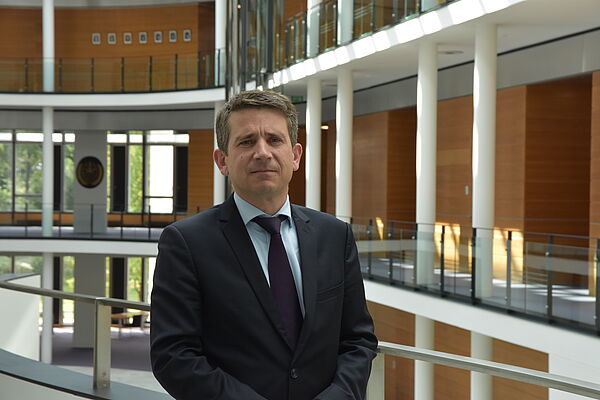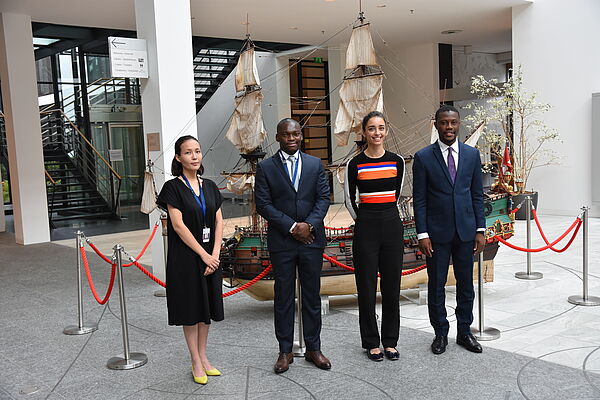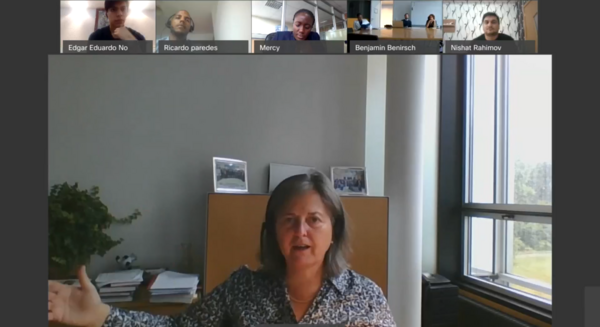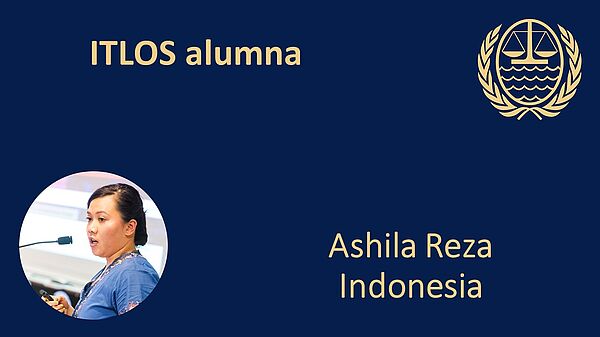Newsletter 2020/3
September 2020
Introduction
The 2020 summer newsletter comes at a time when governments, institutions and individuals are still looking for ways to cope with the challenges posed by the ongoing COVID-19 pandemic. For its part, the Tribunal continues to observe all necessary health and safety measures and is adapting its methods of work accordingly – which includes new arrangements for virtual meetings. The ongoing pandemic demonstrates the need for the Tribunal to be innovative and explore methods utilizing modern technology, as it is determined to meet the challenge and to adapt in order to fulfil its mandate, dealing expeditiously with the cases currently pending before it as well as any new cases that may be submitted.
The thirtieth Meeting of States Parties to the United Nations Convention on the Law of the Sea has also been affected by the pandemic situation. The Meeting of States Parties, which was initially scheduled to be held in New York from 15 to 19 June 2020, was able to convene in New York from 24 to 26 August 2020 to elect seven judges of the Tribunal. I would like to congratulate Ms Kathy-Ann Brown (Jamaica), Ms Ida Caracciolo (Italy), Mr Jielong Duan (China), Ms María Teresa Infante Caffi (Chile) and Mr Maurice Kamga (Cameroon) on their election to the Tribunal as well as Judge Attard and Judge Kulyk on their re-election. We look forward to the swearing-in of the newly-elected Judges during the fiftieth administrative session of the Tribunal, on 1 October 2020. The swearing-in ceremony will be held in a hybrid format and will be streamed live on the Tribunal’s website. As for the dates, duration and format of the remaining meetings of the Meeting of State Parties, so that the Meeting may take up the other items on its agenda, including its consideration of the budget of the Tribunal for the coming two years, these are yet to be confirmed.
Turning to other news from the last few months, in June, I participated in a virtual online signing ceremony at which the Tribunal and Singapore adopted a model agreement. This agreement establishes the terms and conditions under which the Government of Singapore agrees to provide the appropriate facilities for the Tribunal or one of its chambers to sit or otherwise exercise its functions in Singapore. The proactive stance on the part of the Tribunal to enter into such agreements is testament to its capacity and willingness to swiftly adapt to ever-changing times whilst offering a flexible mechanism for the settlement of law of the sea disputes.
In mid-August, a virtual seminar was organized by the International Foundation for the Law of the Sea on “Law-making in the law of the sea and maritime law” with 100 participants from all over the world. As you may remember, the IFLOS Summer Academy had to be postponed this year and so we were unable to welcome the participants to our premises in Hamburg, as we usually do for four weeks each summer. Nevertheless the virtual event allowed me not only to welcome the participants but also to express my pleasure at the fact that such seminars and academic events need not be curtailed by the pandemic. On the contrary, the open invitation to attend the event – and the fact that the recording of the various sessions has been made available on the Foundation’s website – make it more accessible to a wider public.
The Tribunal must continue to operate effectively despite the wide-ranging restrictive measures taken around the world. In this regard, we have made arrangements for hybrid meetings to be held, including the hearing scheduled for October in the Dispute concerning delimitation of the maritime boundary between Mauritius and Maldives in the Indian Ocean (Mauritius/Maldives). As we near the dates set for the hearing in the preliminary objections phase of this case, we have been in close contact with the Parties in order to decide the format that best suits both delegations and the Tribunal, which will be a hybrid format, with some Judges and representatives of the Parties in the courtroom in Hamburg and others joining by video link. I am convinced that the principal function of the hearing, namely to provide an opportunity for “direct confrontation of the parties before the Court and in open court”, can be fulfilled even without the physical presence of all actors. The key aspect is the direct exchange of arguments between the Parties and, with the help of modern video-conference technology, this seems to be possible in a virtual or partially virtual courtroom.
Pursuant to the Statute and the Tribunal’s Rules, hearings before the Tribunal are, in principle, open to the public. Public access is a fundamental feature of proceedings before standing international courts and tribunals but it will be necessary to restrict physical access to the courtroom of the Tribunal for the near future. Public access to virtual hearings will nevertheless be provided by livestream of the hearing, available on the Tribunal’s website.
Concerning news related to the Registry, in June 2020 I was pleased to welcome to the Tribunal Mr Antoine Ollivier, who assumed his role as Deputy Registrar. Mr Ollivier previously served as Legal Officer of the International Court of Justice (ICJ) and earlier as Special Assistant to the Registrar of the ICJ. He has also worked at the Directorate for Legal Affairs of the Ministry of Foreign Affairs in Paris and is the author of several articles and chapters on public international law, the ICJ and the law of State responsibility. I wish Mr Ollivier all the best in his new role.
Lastly, I wish to mention that, although the primary function of the Tribunal is to adjudicate cases, it is nevertheless of paramount importance to transmit knowledge and information to younger generations and I am pleased to note that July saw the resumption of the Tribunal’s internship programme and August the launch of the ITLOS-Nippon Foundation capacity-building and training programme for 2020-2021.
I hope that you and your families are and remain healthy and that you enjoy reading the newsletter.
With my warmest regards,
Jin-Hyun Paik
President
ITLOS Cases
By Order of 19 May 2020, the President of the Special Chamber, having ascertained the views of the Parties, fixed 13 October 2020 as the date for the opening of the hearing on preliminary objections.
Further to consultations held between the President of the Special Chamber and the representatives of the Parties on 1 September 2020, the schedule of the hearing is as follows:
First round of oral argument: 13–15 October 2020 (Hamburg time)
Tuesday, 13 October 2020, 2–3:30 pm, 4–5 pm and 5:30–7 pm: Maldives
Thursday, 15 October 2020, 2–3:30 pm, 4–5 pm and 5:30–7 pm: Mauritius
Second round of oral argument: 17–19 October 2020 (Hamburg time)
Saturday, 17 October 2020, 2–3:30 pm and 4–5 pm (if needed): Maldives
Monday, 19 October 2020, 2–3:30 pm and 4–5 pm (if needed): Mauritius
Public access to the Courtroom will not be permitted but the hearing will be livestreamed on the Tribunal’s website. A recorded webcast will be made available under Webcast Archives after the close of each sitting. The verbatim records of the hearing will be published shortly thereafter on the Tribunal’s website.
Case No. 29: The M/T “San Padre Pio” (No. 2) Case (Switzerland/Nigeria)
The time-limits for the filing of the Memorial of Switzerland and the Counter-Memorial of Nigeria were fixed by Order of 7 January 2020 and the written proceedings are currently ongoing.
Interview with Mr Antoine Ollivier, Deputy Registrar

I took up my functions at the beginning of June, in the extremely strange circumstances presented by the COVID-19 pandemic. We have all been affected by the health situation, so I was relieved to learn, before arriving in Hamburg, that nearly all the Registry staff had been able to return to work in their offices from mid-May, and that I could thus meet them in person as soon as I took up my duties and in quasi-normal conditions.
I was warmly welcomed to the Tribunal by the President and the Registrar, finding I had a beautiful working environment, in modern offices, with a team of experienced officers whose help as I settle into the post is greatly appreciated.
During my career, I have become very familiar with the activities of the International Court of Justice, in various capacities. I started my professional life as assistant, at Paris X Nanterre University, to Professor Alain Pellet; through him I discovered what it was to be counsel and advocate before the Court. Then, as a legal officer at the French Ministry of Foreign Affairs, I worked with teams representing France in several proceedings before the Court. Finally, for the past eight years, I was the Special Assistant to the Registrar of the ICJ, Mr Philippe Couvreur, then a legal officer and Secretary of the Court. In those roles, I was called upon to deal with a wide range of issues, both in connection with the judicial activities of the Court and with administrative and financial matters. The years spent at the Court were extremely interesting and highly educational, especially when I worked with Mr Couvreur, whose wide-ranging culture and long experience of the Court and the United Nations were a great influence on me.
Anyone interested in or working at the Court in The Hague follows the activities of the Tribunal in Hamburg with great interest. It is, of course, a great honour to be able to serve successively at these two institutions, whose proximity is not merely geographic. The Court and the Tribunal share a number of common features. Among many examples, the role of the Registry at the Tribunal is very similar to that of the Court. I am, however, aware that each institution has its own culture and a history entirely its own. In that respect, it is highly stimulating and enriching to learn more each day about the working methods and practice of the Tribunal and its Registry.
Here at the Tribunal, one of my functions is to assist the Registrar in her mission of heading the Registry. I aim to put the experience gained elsewhere to good use by sharing with her my opinions and making suggestions as concerns the administration and work of the Registry, as well as helping to ensure that the outstanding professionalism and team-spirit prevailing amongst the staff endure. I am fortunate in finding everything working very well within the Registry. In that respect, I should not fail to salute the impressive work achieved by the Registrar, Ms Ximena Hinrichs Oyarce, as well as that of the former Registrar, Mr Philippe Gautier, with whom I had the privilege and pleasure to work when he took up his role at the Court.
At present, the Registry’s priority is to provide judges and parties with the best possible working conditions in the current exceptional circumstances, during the upcoming Fiftieth Session of the Tribunal and the public hearing in Case no. 28. The health situation presents several challenges from the legal, organizational and practical points of view. However, as President Paik has recently mentioned, it requires the Tribunal to adapt and innovate, as necessary. It will thus be an opportunity for the Registry to continue to demonstrate its efficiency in the service of the Members of the Tribunal and those subject to its jurisdiction.
Capacity Building

Internship programme
After the first hiatus in the internship programme since the programme’s inception in 1997, the Tribunal was pleased to welcome four new interns during the summer: Kokougan Messiga (Togo), Aiman Ospankulova (Kazakhstan), Maïa Perraudeau (UK/France) and Louino Volcy (Haiti) joined the Legal Office at the start of July. The interns will have the opportunity to support the Legal Office with relevant research and will also be able to attend some of the ITLOS-Nippon Foundation programme lectures.

ITLOS-Nippon capacity-building and training programme on dispute settlement under UNCLOS
After a competitive selection process, Ms Sandrine de Herdt (Belgium), Mr Mohammad Zulhilmie Norazman (Malaysia), Mr Edgar Eduardo Noriega Herrera (Mexico), Ms Mercy Afandi Olando (Kenya), Mr Ricardo Paredes (Dominican Republic), Mr Nishat Rahimov (Azerbaijan), and Ms Martha Amelia Yeanoh Sesay (Sierra Leone) were selected as the 2020/2021 ITLOS-Nippon Foundation fellows.
In light of the pandemic, the fellows are arriving in Hamburg as and when travel restrictions from their respective countries allow. However, their presence in Hamburg will not affect their participation in the programme, and a hybrid system of online lectures ensures that each fellow is able to participate fully in the programme. Over the next nine months, the seven fellows will complete modules on: an introduction to dispute settlement; dispute settlement under the Convention; bringing a case to the Tribunal; maritime delimitation; practical skills; the jurisprudence of the Tribunal; environmental law; maritime law; institutions established under the Convention and other relevant organizations; and current issues in the law of the sea. The fellows will also prepare research papers that are scheduled to be presented to the Judges of the Tribunal in March 2021. We look forward to accompanying the fellows on this journey.
IFLOS Summer Academy
Despite the cancellation of this year’s IFLOS Summer Academy, on 13 August 2020 the Foundation organized a virtual event on “Law-making in the law of the sea and maritime law”. The topics addressed aimed to shed light on aspects of the inception of new law and the changing of existing law. Speakers at the event included President Jin-Hyun Paik and Judges Heidar and Lijnzaad. A recording of the seminar is available on the IFLOS website.
ITLOS workshop for legal advisors (sponsored by the Republic of Korea)
Earlier this year, the Tribunal announced that it would be hosting a new capacity-building programme for legal advisors. The first “ITLOS legal advisers’ workshop, organized with the financial support of the Government of the Republic of Korea”, is set to offer a one-week programme of presentations and discussions to approximately 30 high-level professionals from the Asian region, and will deal with aspects related to the international settlement of disputes in matters pertaining to the law of the sea. The workshop has tentatively been postponed to July 2021.
Meet the ITLOS Alumni

Ashila Reza (Indonesia), Fellow 2017-2018, Third Secretary, Embassy of the Republic of Indonesia in Madrid
My first experience of ITLOS was during the Bali Regional Asia-Pacific Workshop in 2016 where I met President Golitsyn, Judge Heidar and Registrar Gautier. The lectures during the workshop were of great significance both to me and to other Indonesians present at the workshop, since we define our archipelagic home not as a "homeland" but as a home that consists of the land and water ("tanah air"). Little did I know that I would next see the group picture of the workshop again when I arrived at the Tribunal as a Nippon fellow for the 2017-2018 programme.
I was granted a new perspective after completing my fellowship in 2018. Coming from a civil law country, I learned the jurisprudence of the law of the sea at its source at ITLOS. More specifically, I gained direct insight into the law of the sea at its highest level, as well as an understanding of the many approaches to interpretation of that law through the diverse panel of judges, legal officers, lawyers and lecturers. To complement the commercial aspect of the use of oceans, the maritime law lectures provided during the IFLOS Summer Academy, the fellowship and the visit to IMO headquarters in London were especially appreciated. To operationalize my perspectives further, I am thankful for the opportunity to carry out research at the Max Planck Institute for Comparative Public Law and International Law in Heidelberg. I feel that scholars from the Southeast Asia region are still underrepresented in European discourse on international law, and becoming acquainted with the research community there as a practitioner has been very valuable. During the fellowship, the fellows’ capabilities are enhanced by being forced to move out of their comfort zone and become mindful of different skillsets needed to become a well-rounded lawyer. Ultimately, I am very grateful for the experience gained at ITLOS and I will continue to work in the public interest.
After the fellowship, I resumed work at the Ministry of Foreign Affairs of the Republic of Indonesia, where I was assigned to the Directorate of Legal Affairs and Territorial Treaties. I advise on a wide range of issues; from ocean cooperation through bilateral, regional (e.g., ASEAN) and multilateral frameworks; IUU Fishing, BBNJ; maritime security; safety of navigation; the ratification of IMO instruments; to the protection of Indonesian workers at sea. My work enables me to collaborate with stakeholders in fisheries, law enforcement, maritime affairs, marine environment and ocean science. As of this summer, I have been assigned to the Indonesian Embassy in Madrid. I would be interested to catch up with the ITLOS community and prospective fellows if they are in the area or through LinkedIn.
Upcoming Events
The next administrative session of the Tribunal will be held in a hybrid format from 24 September to 7 October 2020.
The next IFLOS Maritime Talks, an online event, will be held on 26 September 2020 on the topic “Cleaner air and better climate? The contributions of the shipping sector to emission reductions”. Information may be found here.
The schedule of the hearing is as follows:
First round of oral argument: 13–15 October 2020 (Hamburg time)
Tuesday, 13 October 2020, 2–3:30 pm, 4–5 pm and 5:30–7 pm: Maldives
Thursday, 15 October 2020, 2–3:30 pm, 4–5 pm and 5:30–7 pm: Mauritius
Second round of oral argument: 17–19 October 2020 (Hamburg time)
Saturday, 17 October 2020, 2–3:30 pm and 4–5 pm (if needed): Maldives
Monday, 19 October 2020, 2–3:30 pm and 4–5 pm (if needed): Mauritius

